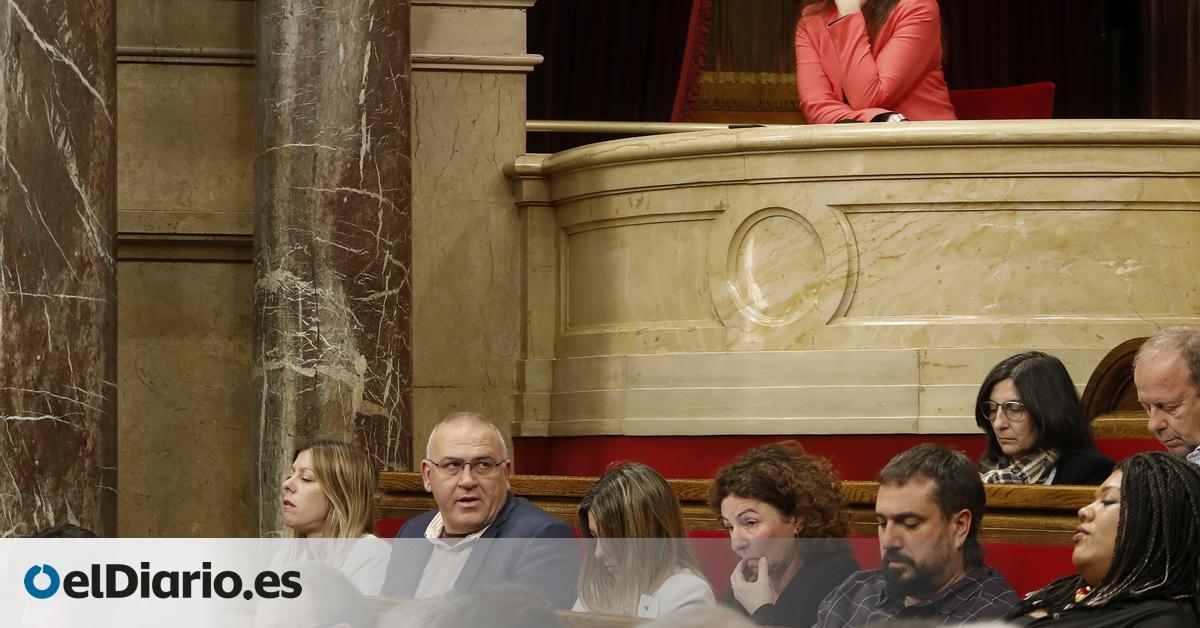
full stop The Central Electoral Board (JEC) has removed the seat from the president of Boards, Laura Borràs, after her conviction for corruption, although the sentence has not been signed. The decision of the electoral body, confirmed by the Catalan News Agency after it was brought forward by ABC, is a new step in the case that was about to cost the political career that was one of the biggest assets of Junts.
Laura Borràs and the “trapis”, a fall in four acts
Further
The JEC had already anticipated in April, when it allowed Borràs and the Parliament to process allegations, that the Junts leader would end without a deputy act. Her case, the JEC verified, is “analogous” to those of Quim Torra and Pau Juvillà, who ended their dismissal as parliamentarians without having a final conviction. There was no other possible ending for Borràs. Formally, the JEC will communicate his decision to the Junts leader this Thursday.
The siguiente in the lists of Junts and the first candidate to occupy the act of deputy of Borràs is Antoni Castellà, a veteran of Catalan politics ex of Union and now leader of Democrats, the independentist splinter of the defunct Christian Democratic Party.
Having already lost all the institutional echo that public office gave him, Borràs still has the presidency of Junts, although he cannot take it for granted either. The two sectors facing each other in the party have called a truce until after the municipal elections, but the internal war to unseat Borràs could return after May 28.
After being sentenced to four and a half years in prison and disqualified for 13 years for prevarication and document falsification, Borràs entrenched himself and refused to resign from his institutional and party posts. The leader of Junts has been ignoring the unanimous request of the rest of the parties for months not to lengthen the interim in the presidency of the Parliament that began in July after her suspension.
Borràs has ignored all the voices that have asked her to step back and continues to insist that she has been sentenced for independence and not for breaking contracts to benefit a friend. A thesis that not even the voices of his own party buy: the president of the Junts guarantee commission, Magda Oranich, has questioned whether Borràs’s case is one of ‘lawfare’. Oranich will be in charge of deciding if Borràs maintains the militancy once the Supreme Court resolves her appeal.
Although public pronouncements are rare, the Borràs case has revived the internal division in Junts. Borràs leads the sector that advocates a unilateral approach and confrontation with the State (without specifying how), while the former ministers, with Jaume Giró and Victòria Alsina at the helm, lead the pragmatic sector, guardian of the essence of convergent management without renouncing the independence. The general secretary of Junts, Jordi Turull, tries by all means that the party does not break up.
New stage in Parliament
With the decision of the JEC, the Parliament no longer has any more excuses to turn the page to the interim that has lived since the suspension of Borràs. Junts has refused to propose an alternative candidacy to preside over the Chamber, but the rest of the groups have shown their intention not to prolong the vacant presidency any longer.
The PSC spokesperson, Alícia Romero, opted this Tuesday to resolve the interim “the sooner the better” once the JEC decided. ERC would also like a quick pact between independentistas that would make a new presidency possible. All in all, it is foreseeable that the groups will wait for Junts to make a move.
This Wednesday, ERC, Junts and the CUP rejected in Parliament the reform of the regulation proposed by the PSC, considering that it was an “ad hoc” approach for the Borràs case. Republicans and anti-capitalists have advocated seeking a “consensus text” to reform the regulation.
In the post-convergent group coexist supporters of appointing one of their deputies to the presidency and filling the institutional vacuum –one of the names that appears the most in the pools is that of deputy Anna Erra– and the group of parliamentarians closest to Borràs , who has hinted that the presidency should be left vacant.
Borràs knew the precedents
Borràs knew that her end as a deputy was near. In her stage as president of the Parliament, she had to manage the case of Pau Juvillà, a CUP deputy convicted of disobedience and who was also deprived of a seat by the JEC without having a final sentence. Despite the fact that she Borràs promised that she would defend Juvillà’s act, the then president of the Parliament ended up complying with the order of the JEC.
It should also be remembered that Borràs harshly criticized his predecessor, the Republican Roger Torrent, for complying with the order of the JEC to remove Quim Torra’s seat. Borràs ended up acting the same as Torrent, and now there is no expectation of disobedience from the vice-president and acting leader of the House, the Republican Alba Vergés.
The only difference between Borràs and the former CUP president and deputy is that his sentence is for prevarication and forgery of documents for splitting contracts to benefit a friend, while those of Torra and Juvillà were for disobedience for not removing yellow ribbons from buildings public.
Both prevarication and disobedience are part of the crimes against the Public Administration. An initial conviction for this type of crime is already enough for the JEC to withdraw the seat, even if the deputy does not have a final sentence.
Beyond the differences between a corruption case and another related to the process, the express withdrawal of a seat by the JEC without a final ruling, endorsed by both the Supreme Court and the Constitutional Court, raises doubts in legal circles, taking into account that it means depriving a deputy of his minutes without exhausting all the remedies to which the law entitles him.
Source: www.eldiario.es

